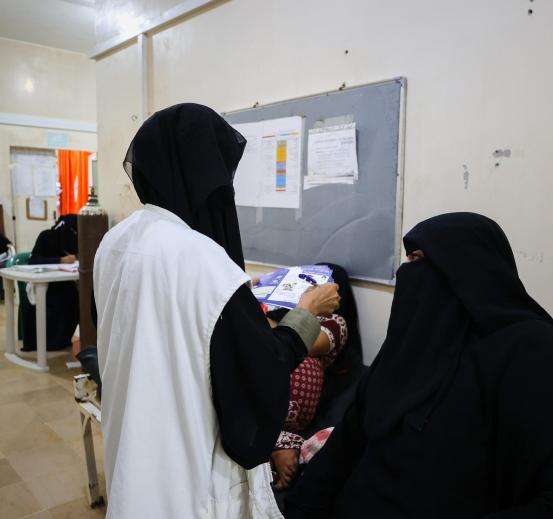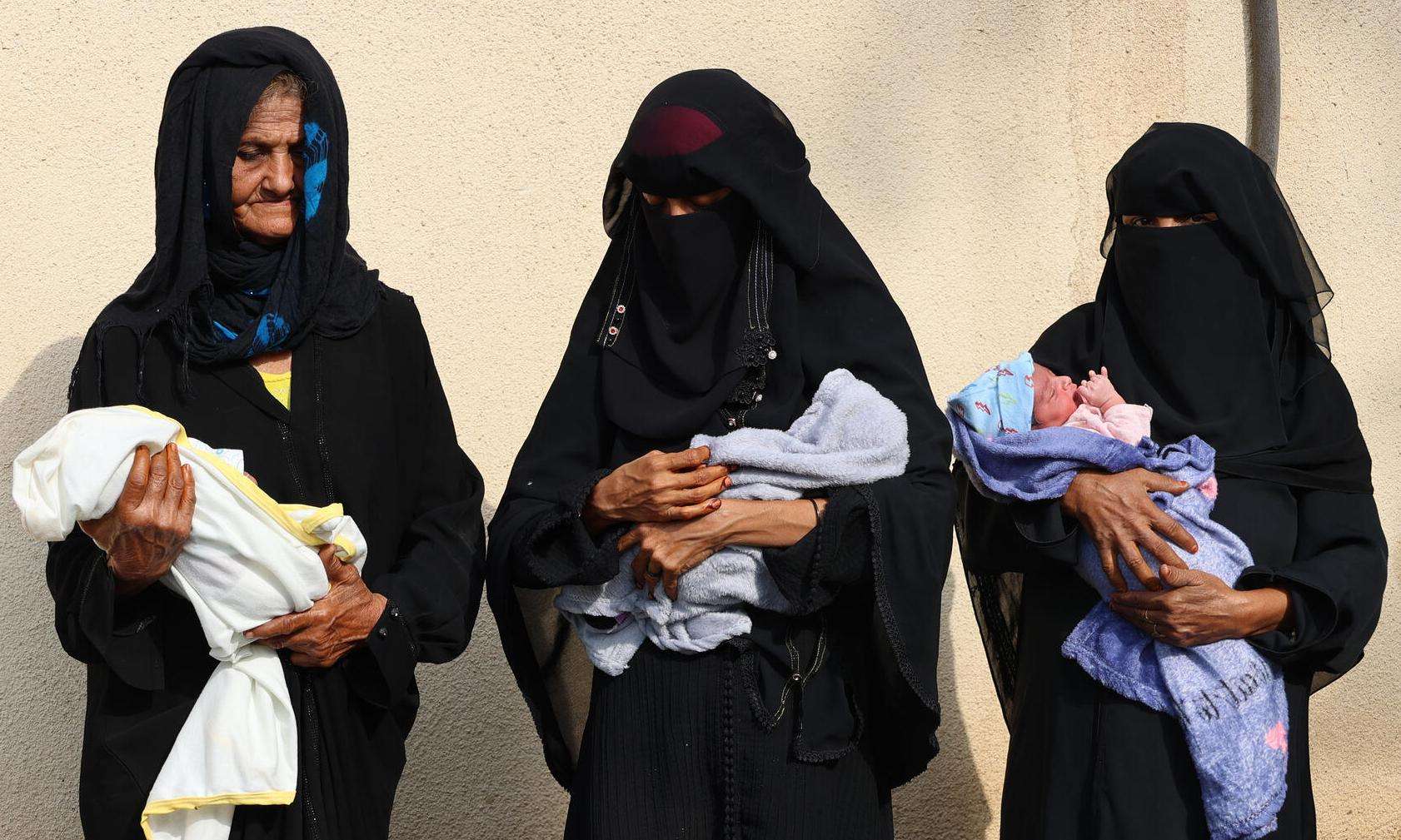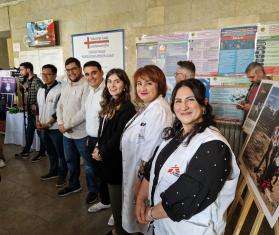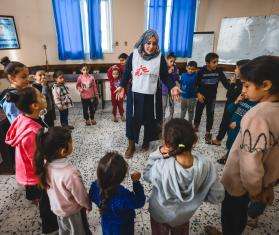Mayasa sits on a bed at Abs General Hospital in Yemen’s Hajjah governorate, where her two-year-old son Mohammad was admitted to the inpatient therapeutic feeding center after being diagnosed with malnutrition accompanied by pneumonia and diarrhea.
Mohammad has been refusing food for a while. When he was a baby, Mayasa could not afford baby formula, so she fed him cow’s milk, bread, and potatoes. This is Mohammad’s fifth stay in the therapeutic feeding center since his first visit when he was six months old.
Although the therapeutic feeding center at Abs Hospital is supported by Doctors Without Borders/Médecins Sans Frontières (MSF) and Mohammad’s treatment is free, Mayasa is in debt from the high transportation costs of the two- to three-hour journey from their home. Despite this, Mayasa never fails to bring her son to the hospital when he becomes ill. She cares deeply about her children’s health, sometimes at the expense of her own; now four months pregnant with her fourth child, she herself has become malnourished.
Like many Yemeni mothers, Mayasa worries every day about how she will feed her children and faces the choice of feeding herself or giving her portion to them.
Mother of MSF Patient
Mayasa
“This is not Mohammad’s first time in Abs Hospital. He has been sick since he was born. He had a high fever; his skin turned yellow, then black. I brought him here and he spent a week on oxygen in neonatology. At six months old, he wasn’t eating so he spent some time in the inpatient therapeutic department.
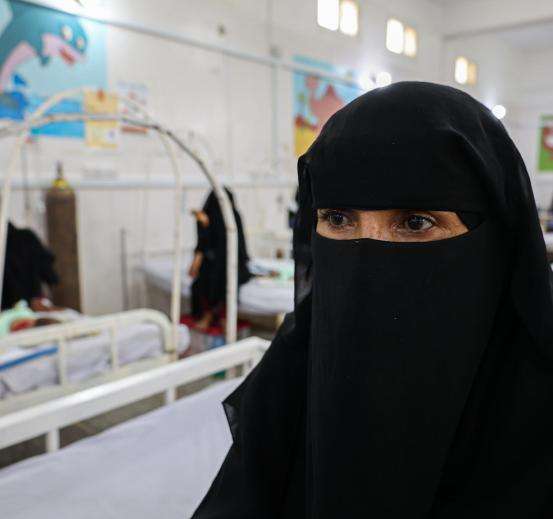
Caretaker burdens and risk factors
“We are seeing a lot of caretakers in the inpatient therapeutic feeding center who are themselves malnourished,” said Dr. Hilaire Pato, MSF pediatrician at Abs Hospital. “This is due to food insecurity in Yemen. If a woman is malnourished, it is hard for her to support her baby.”
In the hospital’s maternity department, Saada, who is in her ninth month of pregnancy, was just admitted due to bleeding and an obstruction of the bowels. She is also malnourished. Saada had no prenatal check-ups during her pregnancy due to the prohibitive cost of traveling to the nearest health center.
Saada’s hometown is “dead,” as she puts it, with no jobs or ways of earning a living. Her family of eight struggles to find enough to eat. “We eat bread and tea, but we don’t eat any meat or fish,” she added. “We used to receive food aid—just a bag of flour and a bottle of oil—but it stopped five months ago.”
Mother of MSF patient
Saada
“I have six children; the youngest of them is 18 months old.
I don’t follow up on my pregnancy, I only did with my first child. I simply don’t have the money to visit health centers, and hospitals are far away.
I spent a lot of time on the road to come to the hospital. I had to pay all that I owned to reach it. We have no income. My husband used to plow fields but now he is sick and can’t work.”
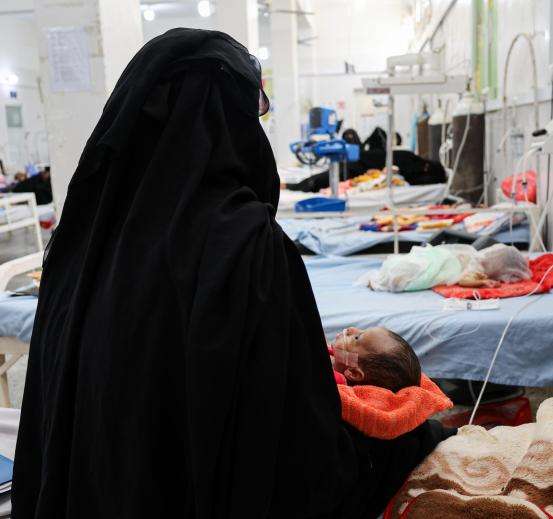
Compounding challenges and food insecurity
The malnutrition crisis in Yemen has many underlying causes. After over a decade of conflict and an unrelenting economic crisis, many people in Yemen have lost their livelihoods. High inflation rates have reduced people’s purchasing power so they can no longer afford enough nutritious food, and diminishing food aid distributions, including the suspension of the World Food Programme’s general food distributions in northern Yemen, have exacerbated an already dire situation.
At the same time, pregnant people’s access to medical care, including prenatal and postnatal care, is seriously limited due to the lack of functional primary health care facilities and the high cost of transportation, resulting in early signs of malnutrition going undetected for many.
“To address malnutrition among mothers and children in Yemen, it is crucial to fill the critical gaps in nutrition and food assistance programs,” said Dr. Pato. “In view of the dramatic shortfalls in donor funding that we are seeing in Yemen, it is essential that a targeted approach should be implemented, focusing on the most vulnerable groups, specifically children under five, pregnant women, and new mothers. There is also a great need to increase awareness about the importance of breastfeeding, which helps reduce the risk of malnutrition and its associated complications.”
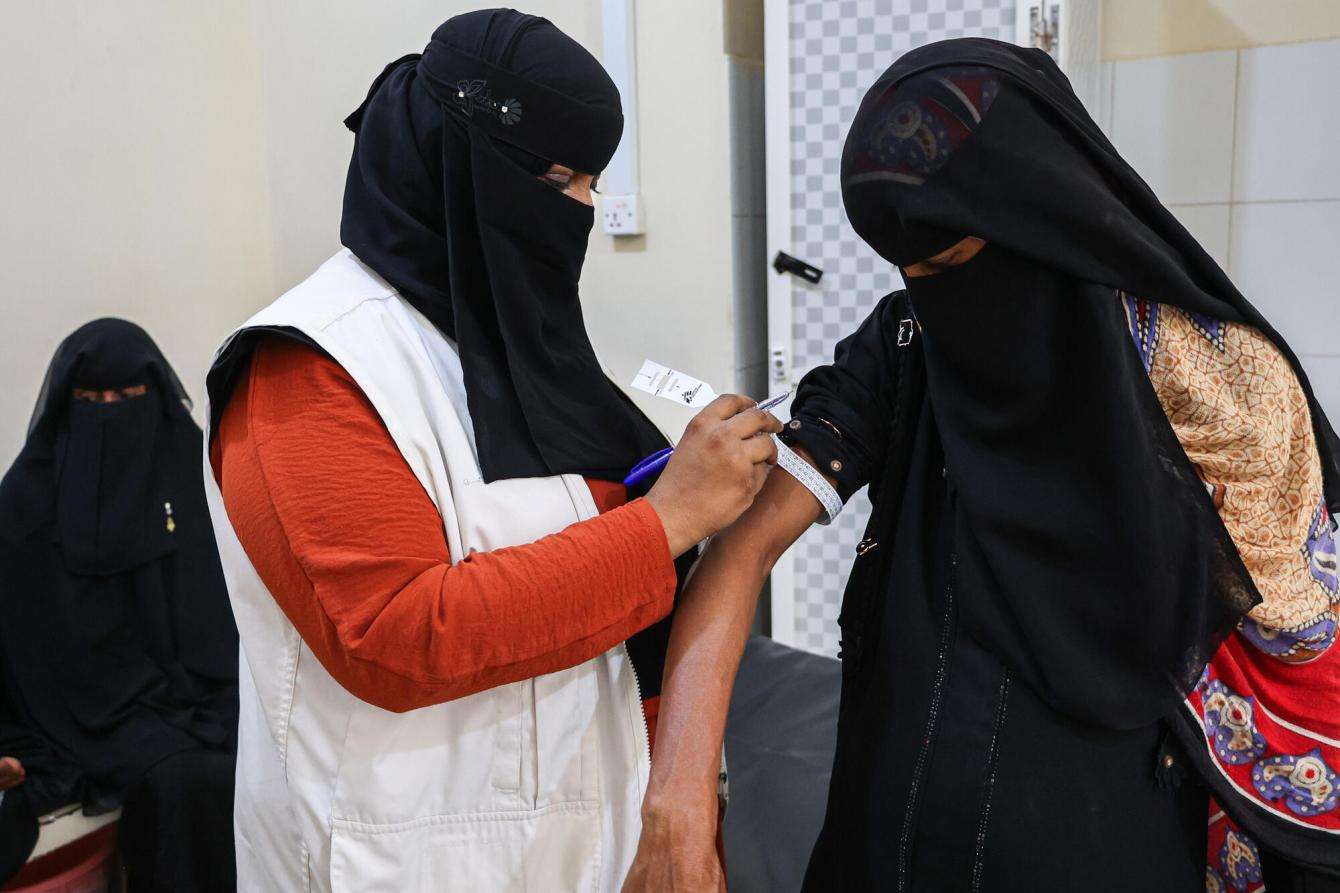
MSF staff measure the mid-upper arm circumference of all women admitted to the maternity department at Abs to determine their nutritional status. The number of women with either moderate or severe malnutrition has increased steadily over the past two years.
In 2021, 51 percent of women admitted for maternity care at Abs Hospital were malnourished, while 4 percent had severe acute malnutrition. In 2022, this rose to 64 percent, with 6 percent suffering from severe acute malnutrition. By February 2024, a massive 68 percent of women admitted to the maternity department were malnourished.
Sixty kilometers away from Abs, at the MSF-supported Al-Qanawis Mother and Child Hospital in Al-Hudaydah governorate, there are similar conditions. In 2023, 47 percent of women admitted were malnourished, rising to 49 percent in February 2024. Maternal malnutrition is a risk factor for malnutrition in their babies; in 2023, 24 percent of all admissions to MSF’s nutritional program in Abs were children under six months old.
“Pregnant women with malnutrition are at a greater risk of complications during pregnancy and delivery, the main one being iron deficiency or anemia,” said Dr. Pato. “A malnourished woman has a high risk of having a malnourished baby, and it will also be harder for her to breastfeed her child.”
MSF community health workers go door to door in Al-Hudaydah governorate to measure the mid-upper arm circumference of children, pregnant women, and new mothers to identify those with malnutrition and prevent their condition from deteriorating. Anyone showing signs of malnutrition is referred to the nearest health center with therapeutic feeding capacity. There are, however, challenges in ensuring continuity of treatment for pregnant women and new mothers with malnutrition, as there are major gaps in such programming in regional health centers.
MSF Patient
Aisha
“I came to the hospital in Abs because I had been bleeding for four days. This is my second miscarriage.
My family was displaced five years ago. We now live in the town of West Maddah, which is one hour away from Abs. When we arrived, we built a small house out of banana leaves. It wasn’t sustainable during the rainy season. We managed to build a house out of mud.
My husband has kidney failure so he can’t work. My son tries to find daily work wherever he can. We barely have any income to feed our family. We have never received any food assistance.”
